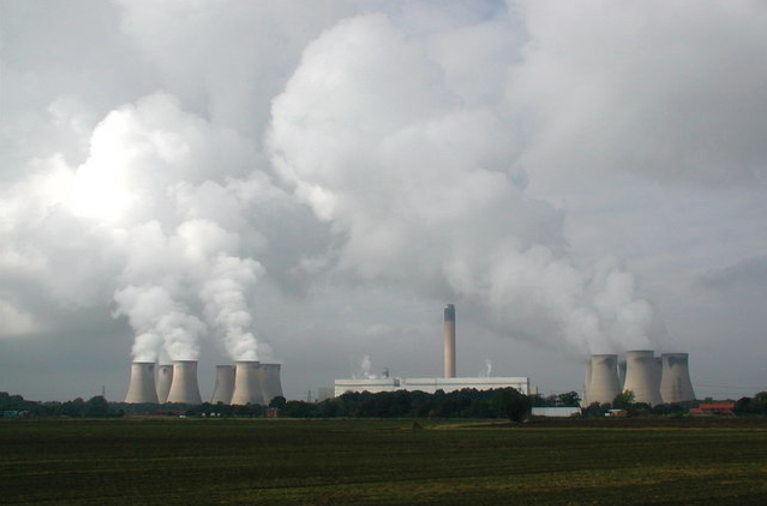The owner of Britain’s biggest power station could receive billions of pounds in green subsidies for a flagship ‘carbon capture’ project even if much of the carbon ends up being released into the atmosphere, openDemocracy can reveal.
Drax’s project at its North Yorkshire power station is supposed to remove CO2 from the atmosphere by burning wood, capturing the carbon and storing it under the North Sea.
But under the funding mechanism proposed by the government, Drax could still claim subsidies for burning wood to generate power even if the carbon capture part of the project fails to work as promised.
Drax currently receives more than £800m a year for generating electricity from burning wood pellets without capturing any of the emissions. Those subsidies are due to end in 2027 and environmental groups hoped that would curtail pellet burning, which they say can release more CO2 than burning coal. But the groups fear the new mechanism could allow Drax to carry on polluting the atmosphere for many more years.
Electricity from Drax’s biomass burning is classified as renewable because it says the pellets come from forests which are “actively managed” to absorb and store more carbon. Scientists and environmental groups, however, question the company’s claims, saying replacement trees take a long time to grow, cutting down forests destroys biodiversity, and importing pellets is emissions-intensive.
Drax makes even bolder claims for its “bioenergy with carbon capture and storage” (BECCS) project, saying it will not just produce renewable power but deliver “negative emissions essential for fighting the climate crisis”.
Under the funding mechanism, proposed in a consultation by the Department for Business, Energy and Industrial Strategy (BEIS), Drax would receive one subsidy for the electricity generated by burning wood pellets and a second subsidy for capturing carbon emitted in the process.
The plan, which Drax had demanded to ensure “revenue certainty”, would permit the company to keep earning the electricity subsidy at times when it was unable to capture and store carbon.
But some fear this could mean the carbon capture aspect of the deal ends up being sidelined, with the result that emissions-intensive biomass is burnt without restriction, unless receipt of the electricity subsidy is pegged to a minimum level of carbon capture.
Carbon capture
Drax says the BECCS project will remove “up to 95% of the CO2” emitted when burning wood pellets and make it a “carbon negative” company by 2030.
But similar promises made about the handful of carbon capture plants built to date worldwide have repeatedly been broken. The Boundary Dam carbon capture power plant in Canada was supposed to capture up to 90% of CO2 emissions, but captured only 44% over several months last year because of technical problems.
Environmental groups are calling on the government to set much tighter conditions that would force Drax to deliver on its carbon negative promise by making any subsidies for BECCS contingent upon the project capturing 95% of the CO2.
BEIS refused to respond directly when asked by openDemocracy if it would require Drax to capture a minimum level of CO2 to receive any subsidy and, if so, what that level would be.
A BEIS spokesperson said: “The government will set out further details of the business model [for supporting BECCS] in due course.”
Almuth Ernsting of Biofuelwatch, which opposes subsides for Drax’s BECCS scheme, said:
“We fear that BEIS’s proposal is a thinly disguised offer to allow Drax to use claims about BECCS in order to obtain huge new subsidies well beyond 2027 regardless of whether they capture any CO2.
“If BEIS goes ahead with those plans, many more wildlife and carbon-rich forests in regions such as North Carolina, British Columbia and Estonia face being cut down as a result, harming climate biodiversity and communities living near those forests and near polluting pellet mills.”
Phil MacDonald, chief operating officer of climate think tank Ember, said BEIS’s proposal for subsidising BECCS had “loopholes big enough to drive a truck through”.
He added:
“The limited trials of carbon capture and storage so far reveal a track record of intermittency. Coal plants with CCS at Kemper County in the USA and Boundary Dam in Canada have been able to capture their emissions for as little as half the time the power plants are operating. The UK government must not repeat this mistake with further subsidies for biomass.
“Recent science shows burning wood for power cannot be assumed to be carbon neutral, and risks [causing] emissions higher than coal.
“Before the government commits to long term subsidy, Drax must prove it can capture all its emissions, and demonstrate it has a low-risk, genuinely low-carbon source for its biomass within the UK – not imported global forests.”
Ember calculated in a report last year that Drax’s BECCS plant could cost British energy bill payers £31.7bn in subsidies over 25 years, or £500 a household. (It is not known how much of this would relate solely to electricity generation, and how much to carbon capture.)
Drax said government support for BECCS would be subject to “strict eligibility criteria and if progress can be demonstrated on delivery of both the power BECCS project and the associated CO2 transport and storage network”.
It added: “First-of-its-kind BECCS power is best supported using a two-part business model that values power and negative emissions separately, so as to maximise the outputs of both and ensure any market risks are appropriately accounted for.”
This month BBC Panorama reported that Drax was cutting down rare, old-growth forest in Canada to make wood pellets.
Drax said 80% of the material used to make its pellets in Canada was “sawmill residues” and the rest was “waste material collected from the forests which would otherwise be burned to reduce the risk of wildfires and disease”.
Teaser photo credit: Northeast of Drax. By Paul Glazzard, CC BY-SA 2.0, https://commons.wikimedia.org/w/index.php?curid=7932928





